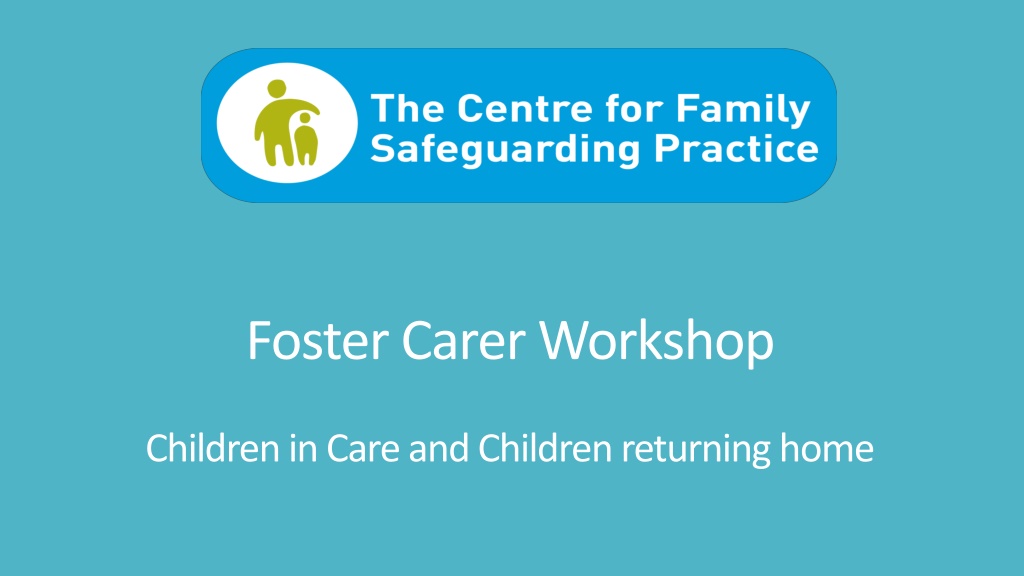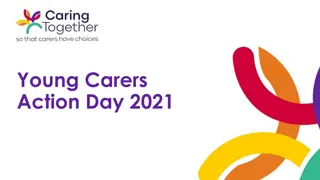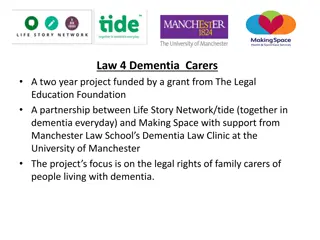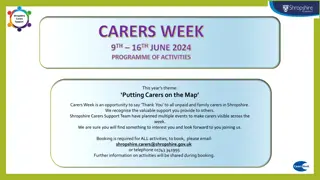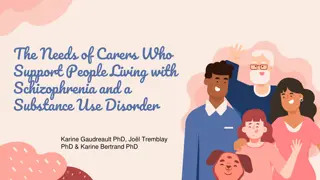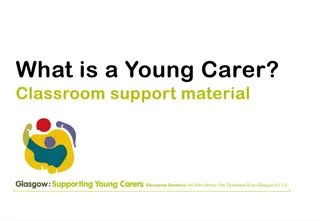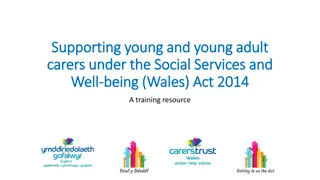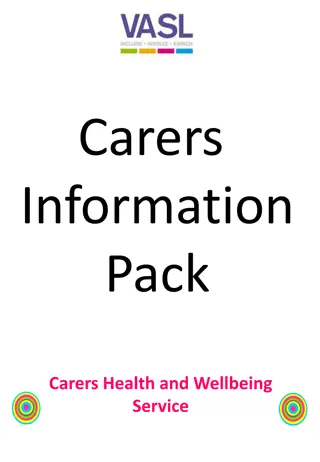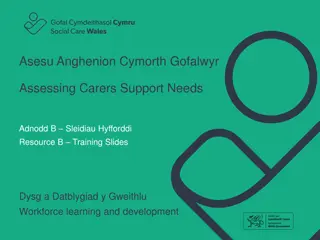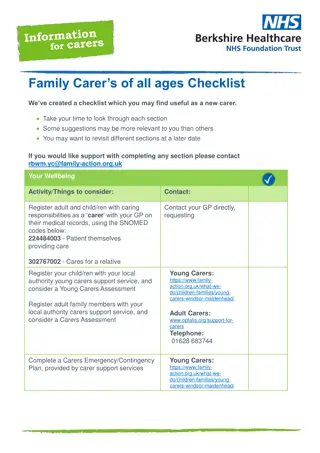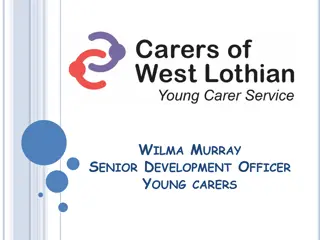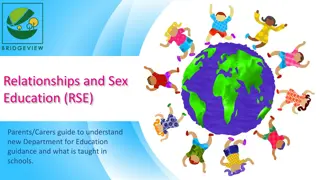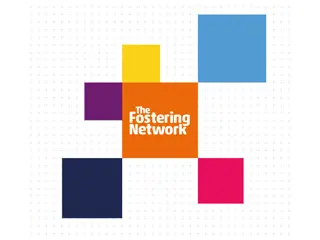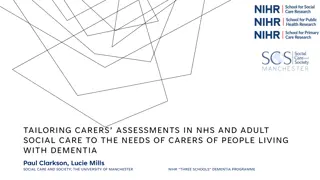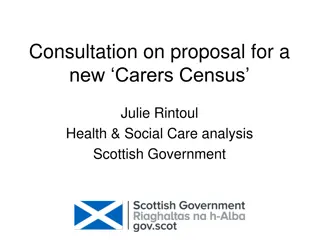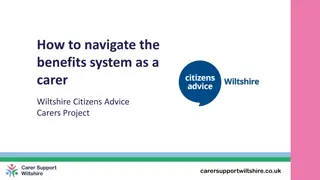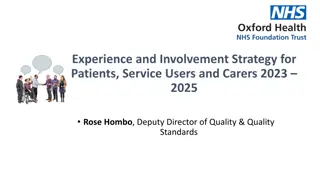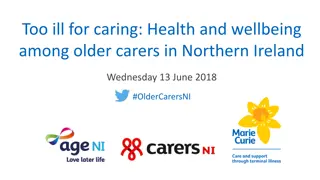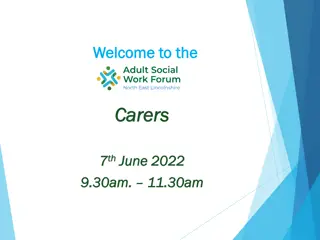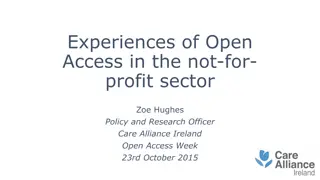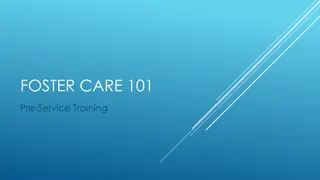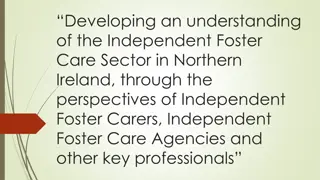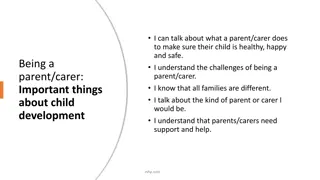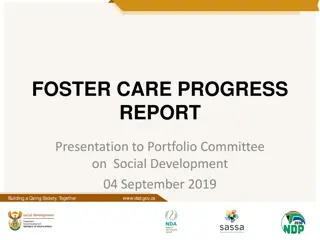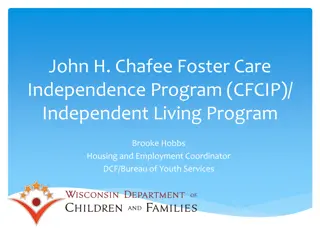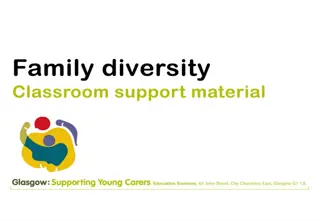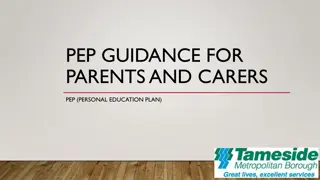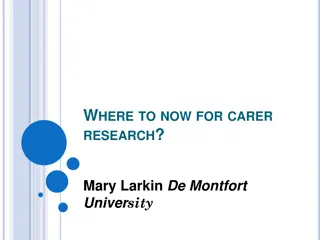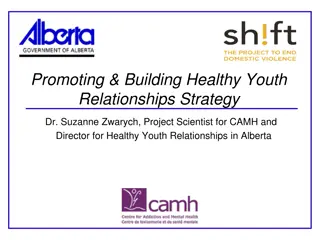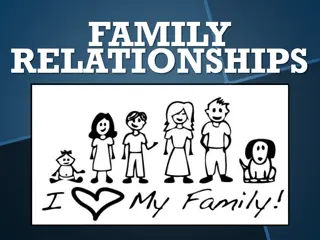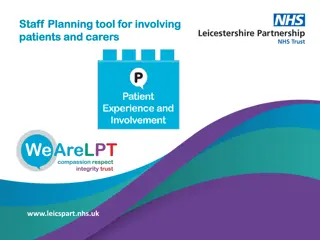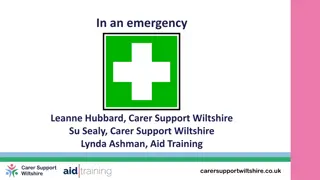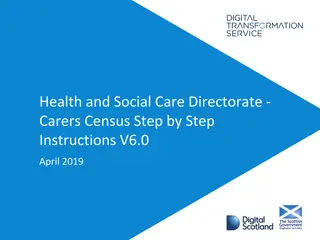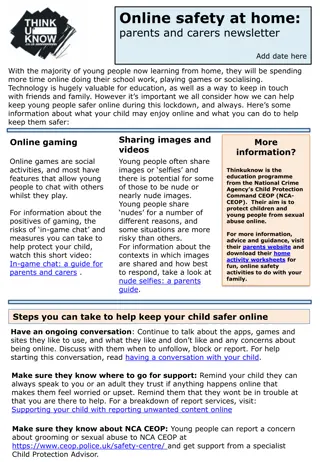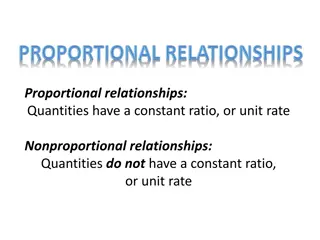Understanding the Role of Foster Carers in Family Relationships
Explore the vital role of foster carers in strengthening family bonds and supporting children in care to reintegrate with their birth families. Reflect on the importance of safeguarding children, promoting their welfare, and providing necessary services to meet their needs effectively. Embrace a family safeguarding approach focused on building, maintaining, and repairing relationships while prioritizing the well-being of children.
Download Presentation

Please find below an Image/Link to download the presentation.
The content on the website is provided AS IS for your information and personal use only. It may not be sold, licensed, or shared on other websites without obtaining consent from the author. Download presentation by click this link. If you encounter any issues during the download, it is possible that the publisher has removed the file from their server.
E N D
Presentation Transcript
Foster Carer Workshop Children in Care and Children returning home
Explore the role of foster carers in strengthening family relationships and supporting children to return home where possible Learning Objectives Consider how contact/family time could be used to support children to re-build relationships with birth family.
In the majority of cases, families become involved with children s social care because they are parenting in conditions of adversity, rather than because they have caused or are likely to cause significant harm to their children. We have a shared obligation to help families raise their children. The Case for Change The independent review of children s social care https://childrenssocialcare.independent-review.uk/
Provision of services for children in need & their families: (1) It shall be the general duty of every local authority (a) to safeguard and promote the welfare of children within their area who are in need; and Part Three Children Act 1989 (b) so far as is consistent with that duty, to promote the upbringing of such children by their families, by providing a range and level of services appropriate to those children s needs Any service provided by an authority may be provided for any member of his family, if it is provided with a view to safeguarding or promoting the child s welfare
Our primary duty to children is to safeguard them from actual or likely Our primary duty to children is to safeguard them from actual or likely significant harm and promote their upbringing by their families significant harm and promote their upbringing by their families Vision and values of Family Safeguarding approach We do this by: assessing needs & providing actual services to meet needs of children & their families taking a restorative approach to working with families, building, maintaining and repairing relationships where harm has been caused caring for children until it s safe for them to go home fulfilling our duties to share PR and promote contact/family time developing MI skills to promote engagement of families and create change believing all people have intrinsic worth and a right to help and support
Mentimeter Mentimeter What are your views What are your views about children about children returning home from returning home from care? care?
O Outcomes utcomes for for care care experienced experienced people people Many care experienced people leave care and Many care experienced people leave care and live happy and fulfilling lives, and that care can live happy and fulfilling lives, and that care can provide the lifeline which leads to a better life provide the lifeline which leads to a better life than they would have had if they remained at than they would have had if they remained at home. Care can be a positive, transformational home. Care can be a positive, transformational and life saving experience. and life saving experience. (Care Review Report, May 2022) (Care Review Report, May 2022)
Over Over- -represented in mental health and prison settings represented in mental health and prison settings More likely to die prematurely More likely to die prematurely O Outcomes utcomes for for care care experienced experienced people people Lower educational attainment & subsequent disadvantage Lower educational attainment & subsequent disadvantage More likely to be unemployed/in low skill jobs More likely to be unemployed/in low skill jobs More likely to have their children removed by Children s More likely to have their children removed by Children s Service (Rahilly & Hendry 2014) Service (Rahilly & Hendry 2014) Negative outcomes linked to lack of support, isolation, Negative outcomes linked to lack of support, isolation, loneliness (Munro 2011) loneliness (Munro 2011) Relationships are key to emotional wellbeing, quality and Relationships are key to emotional wellbeing, quality and continuity continuity Care often breaks children s existing relationships with Care often breaks children s existing relationships with family & friends (Care Review, 2013) family & friends (Care Review, 2013)
Children want to maintain strong links with their family Children want to maintain strong links with their family Recognise that for some children being in care may not be better off in the Recognise that for some children being in care may not be better off in the longer term longer term Moving away from identifying and managing risks to meeting family needs Moving away from identifying and managing risks to meeting family needs Need for Need for change change Needs of family and the likelihood of harm can change over time Needs of family and the likelihood of harm can change over time- - families change. change. families Are children still in care for the right reasons? Are children still in care for the right reasons? Impact of unsuccessful return home for children and families and re Impact of unsuccessful return home for children and families and re- -entry into care into care- - Need to break this cycle Need to break this cycle entry Children returning home from care to a parent or relative, planned or Children returning home from care to a parent or relative, planned or unplanned is a common outcome unplanned is a common outcome
For most For mostchildren, returning children, returninghome to a parent or relative after being looked after parent or relative after being looked after is a common outcome"(Wilkins and is a common outcome"(Wilkins and Farmer, 2015) Farmer, 2015) home to a Discussion Discussion What does this mean for practice? What does this mean for practice?
What gets in the way of planning for children to What gets in the way of planning for children to return home? return home?
Barriers to planning for children to return home No time for planning or preparation Attitude towards parents Worries/Fears
Group discussion: Group discussion: How can foster carers How can foster carers support children to support children to return home? return home?
MS Teams chat MS Teams chat What makes return What makes return home for children home for children more successful? more successful?
What makes return home more What makes return home more successful? successful? Good relationships between carers and birth families Good relationships between carers and birth families Preparation Preparation Support for parents and carers Support for parents and carers Support from foster carers when children are returning home Support from foster carers when children are returning home
Some messages on carers supporting children to return home Support from foster carers and residential workers play a significant role in children returning home. (Thorpe 2007 cited in Thoburn 2009, Fernandez,2012 When placement caregivers and foster carers develop an exceptionally supportive relationship with parents, there are significantly fewer return breakdowns (Farmer et al. 2011). Foster carers remaining available and involved after child leaves the foster home. Provided after-care services to assist parents or children, such as respite after children had returned home, which is highly valued by the children and their parents (Aldgate and Bradley 1999). Social workers are influenced by the views of residential workers and foster carers about children returning home (Thoburn, 1980) Residential workers work closely with parents to encourage return and parents may feel more able to trust them (Farmer and Parker 1991). Research in UK, Australia, US shows the importance of foster carers mentoring parents, supporting contact and playing a supportive role after children return home ( Child Welfare Information Gateway 2006, 2011, Fernandez 2012, Farmer 2014). A positive relationship between foster carers and parents may allow children to avoid the stress of divided loyalties. Caregivers sometimes find that planning for return happens outside the review process, so that they do not have sufficient opportunity to help children prepare for returning home. This highlights the importance of involving carers in preparing children to return home and providing follow up support.
Family Time Family Time Nurturing life- long relationships
Mentimeter Why is family time important for children?
Reassures the child that their family are safe, valued and not forgotten Supports children to know and embrace their family, origins, culture, identity- who they are and were they come from. Creates opportunities to strengthen relationship with family, siblings, extended family and connected people Some reasons why Some reasons why family time with birth family time with birth family is important family is important Children understand their life story better and contact creates opportunities for parents to contribute to their child s understanding of their life story. Creates opportunities for parents to become more involved in understanding and meeting the needs of their children Strengthens possibilities for children to return home Progression of good quality family time from supervised to unsupervised naturally moving towards children returning home Gives children permission to enjoy a relationship with their birth family and their foster family- they don t have to choose sides or split their loyalties
One of the key principles of the Children Act 1989 is the presumption that there should be continued contact between the child and their family while the child is in the care of the local authority. Children Act 1989 on contact This is appropriate for care provided under the 1989 Act, where the underlying philosophy is to work in partnership with the family and towards children returning home where possible, provided that this is consistent with the individual child s welfare
Some research messages on contact/family time Cleaver s (2000) research found that successful return home of children can be promoted by purposeful, planned, well- paced, well-resourced and reviewed contact, supported by parental motivation, a positive child response to increased contact and good attachment between parent and child (Sinclair 2005). Often, too little work is done with birth families prior to children returning home; contact offers the opportunity for purposeful work to be done in preparation for return home(Boddy et al. 2013).
Lemn Sissay (Care experienced adult) shared at a webinar that he will be collecting his OBE award alone because there is no family member who wants to go with him Relationships matter (March 2022, Community Care) Every child who leaves care should have at least 2 loving relationships to support them in the future (Care Review, 2022)
Mentimetre What support would you need to assist children to return home to their birth family?
Mentimeter Mentimeter What would you take away from today s session to support you?
Suggested Reading The Children Act 1989 The Children Act 1989 The Children Act 1989 Final Report - The Independent Review of Children's Social Care (independent-review.uk) Final Report - The Independent Review of Children's Social Care (independent-review.uk) Improving the chances of successful reunification for children who return home from care: a rapid evidence review (whatworks-csc.org.uk) Improving the chances of successful reunification for children who return home from care: a rapid evidence review (whatworks-csc.org.uk) The Care Crisis Review: Options for Change - Family Rights Group (frg.org.uk) The Care Crisis Review: Options for Change The Care Crisis Review: Options for Change - - Family Rights Group (frg.org.uk) Family Rights Group (frg.org.uk) Lecture by Lord Justice McFarlane: Holding the risk - The balance between child protection and the right to family life (judiciary.uk) Lecture by Lord Justice McFarlane: Holding the risk Lecture by Lord Justice McFarlane: Holding the risk - - The balance between child protection and the right to family life (judicia The balance between child protection and the right to family life (judiciary.uk) ry.uk) https://frg.org.uk/lifelong-links/ https://frg.org.uk/lifelong- -links/ Family Rights Group Family Rights Group Lifelong Links: Lifelong Links: https://frg.org.uk/lifelong links/ Reunification: an evidence-informed framework for return home practice (nspcc.org.uk) Reunification: an evidence Reunification: an evidence- -informed framework for return home practice (nspcc.org.uk) informed framework for return home practice (nspcc.org.uk) The Care Planning, Placement and Case Review (England) Regulations 2010 (legislation.gov.uk) The Care Planning, Placement and Case Review (England) Regulations 2010 (legislation.gov.uk) The Care Planning, Placement and Case Review (England) Regulations 2010 (legislation.gov.uk) Ethnicity and children s social care (publishing.service.gov.uk) Ethnicity and children s social care (publishing.service.gov.uk)
Contact us: FSProjectTeam@Hertfordshire.go v.uk
